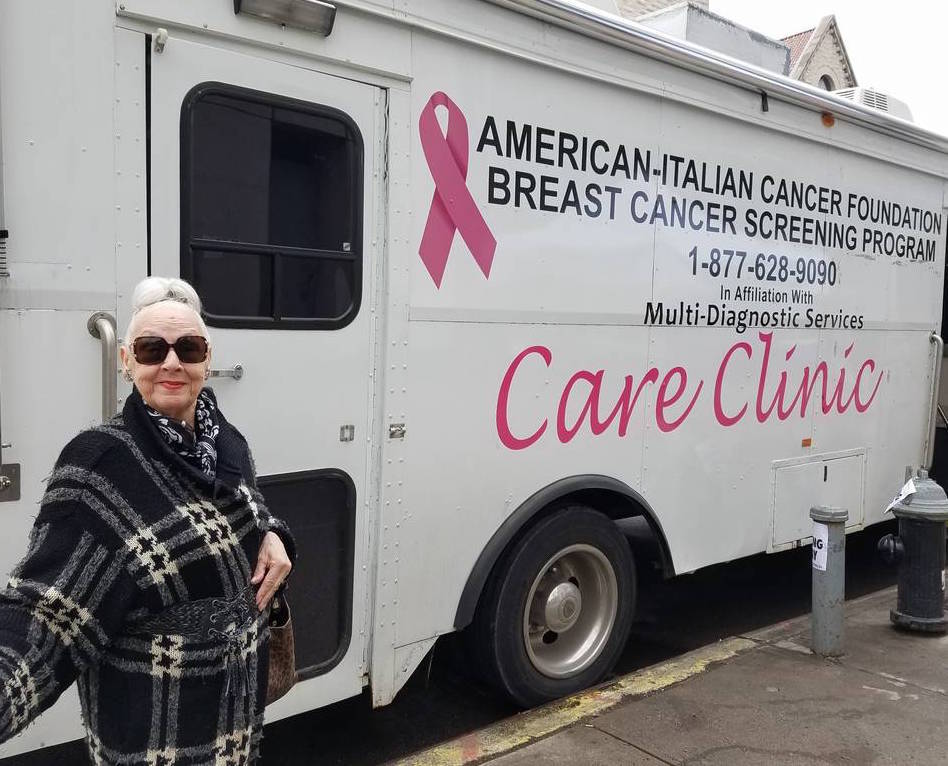A Mobile Care Clinic in NYC to Help Fight Breast Cancer
The American-Italian Cancer Foundation was founded in 1980 by Italian oncologist and politician Umberto Veronesi and Alessandro di Montezemolo. Together with some of the best Italian and American researchers and corporate leaders, the Foundation operates with the mission to support cancer research, education, and control.
Throughout the years, prominent individuals in science and business joined the foundation to give their hearts and souls to the community battling the global threat of cancer. Notable names include Italian industrialist and politician Umberto Agnelli, Nobel Prize Winner in Physiology of Medicine Renato Dulbecco, and US Senator Claiborne Pell, among others. The Foundation began sponsoring postdoctoral fellows from Italy with approximately 20-25 fellows coming to the U.S. each year to conduct cancer research. The fellows are scattered throughout the country, with some of them here in New York’s major cancer centers.
The Mobile Care Clinic
The mobile care clinic is one of the brightest examples of how much the Foundation cares not only about improving research from a scientific and academic point of view, but also about being a part of the community. A necessity to some individuals, the clinic works to shorten the distance between patients and quality medical care, which is often complicated by bureaucracy.
We had the chance to go witness the beautiful work that the “Mobile, No-Cost Breast Cancer Screening” does for the community of New York when it stopped in front of The Ryan Women and Children’s Center, on April 21st, for a special screening program sponsored by Colavita USA. We talked with Ruth L. Vega–Director of Cancer Screening, Outreach, and Education for AICF–who explained the event, the significant support of the Italian sponsors, and the importance of cancer awareness.
“We operate this mobile care clinic. Here, we do mammograms, clinical breast exams, and education on self-breast awareness,” said Ruth, explaining to us the work that they do.
“Our focus is really on making breast cancer [screening] available to medically underserved women, women with no insurance, who have low income, women of color. We provide the women with this service at no cost. If they don’t have insurance, they don’t have to pay anything. If they do have insurance, we take their information, but they don’t have to pay either. We also do it in conjunction with a community based organization that knows the women of this community and can help us to let them know that this service is available to them.”
“We go to a different location every day, Wednesday through Sunday," continues Ruth, "so we’re able to see women who can come during the week and also on the weekend. So if they have a job or they care for kids, they can do it on the weekend. We cover all of New York’s five boroughs.”
Women can easily make an appointment just as they would with any other medical facility. They have their mammograms, and the results are sent via mail. If the radiologist sees that something is suspicious, the women are contacted by the organization and helped to find diagnostic testing and treatment.
The Importance of Awareness and Communication
Of course, breast cancer awareness is the key to prevention. The way in which awareness is spread can make all the difference–especially in a city like New York, which is so diverse. We asked Ruth about how the Foundation reaches out to women.
“Breast cancer awareness, overall, has been raised in New York. What we try to do is work with community based organizations that know the women and that could get our message to them. So if they speak a language other than English and Spanish, which we have capacity for, then we usually partner with the community based organization that can get the message out in their language. Women are from different places in the world, so there are some cultural divides, and these organizations help us to get the message out.”
Communication is also important for dispelling misconceptions and clarifying uncertainties. For example, some women don’t know how often they’re supposed to get a mammogram. AICF follows guidelines from the National Breast Cancer Foundation and the Susan G. Komen organization, and it looks to spread their messages and recommendations to the women served.
So how often and from what age should women start getting tested for breast cancer?
“Usually at 40 years and older, you start doing it once a year,” says Ruth. “Not before, unless you have a family history. When a woman is younger, different tests are usually recommended for her, not a mammogram.”
We followed Ruth inside the mobile van and had the chance to meet some of the women who were tested that day. We spoke with one of them, a Latin woman who communicated with us in Spanish, which Ruth kindly translated.
“Last year, I had come to the clinic [The Ryan Center] because my kids get seen here, and I saw the van. I wanted to get a mammogram, but I was always fearful–fear of the unknown. I was always afraid to do it at the hospital because I found it to be a very cold environment. But I knew I had to go, so today I came, and I got it done.”
Another woman who had taken the test the year before said to us, “I like that it’s right here. When you make an appointment with a hospital, you have to wait a long time to be seen. Here, since they already know me from last year, they called me saying that I’m due, and I could come here.”
The Sponsor: Colavita USA
Every year the mobile clinic and the screening program is supported by some great sponsors. This year Colavita USA–the Italian food company that produces and imports authentic Italian products like oil, vinegar, pasta and sauces–embraced the mobile clinic’s cause and covered the daily expenses.
“As you can imagine, bringing out medical personnel, the equipment, the travel, that’s all at a cost,” explains Vega. “Colavita USA graciously said they were going to sponsor today. And in addition to that, they gave out gifts to the women. They gave them some oil and vinegar and some pasta. They love it! It’s wonderful to have them as our partners.”
Thanks to Colavita USA, 37 women received no-cost mammograms and clinical breast exams on April 21st. On the subject of food, genuine Italian products are a fundamental part of the Mediterranean diet, which is considered one of the healthiest eating regimens. Again, trying to dispel preconceived notions, we asked Vega about the relationship between cancer and nutrition.
“A good healthy diet, low in cholesterol with lots of vegetables, is always the best diet for your health in general. But specific to cancers, it has been found that women who have much leaner diets actually do better. Asian women who have lots of fish in their diet or the Mediterranean diet–those kinds of diets reduce the rates of cancer that we see.”
For more info and to schedule your Breast Cancer Screening today call 1-877-628-9090 or check the AICF website here >>











































i-Italy
Facebook
Google+